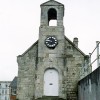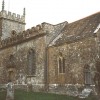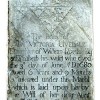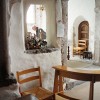Previously, we have written about the respected Dorchester journalist Harry Pouncy (1870-1925) and John Pouncy (1818-1894) the house painter turned photographic innovator and his son Walter Pouncy (1845-1918), who in his day was Dorchester’s pre-eminent photographer. But the municipal records for Dorchester reveal that in the early 17th century many of the family were an unruly lot. (See our stories: ‘Harry Pouncy – A Great Publicist for the Dorset Scene,’ and ‘John Pouncy’ in the Dorchester Category.)
Frequently on the wrong side of the law they saw themselves as victims of the town authorities. As butchers they leased their premises in the Shambles near St. Peter’s church from The Corporation. They were a couple of rungs up the social ladder and one or two of them were surprisingly well connected. Much of the trouble stemmed from them preferring the old ways; they were at odds with those trying to reform the town but at the same time some of them were Freemen of the town and one of them was appointed the town’s “Viewer of flesh.”
In 1606, after the arrival in Dorchester of the puritan minister the Reverend John White, the townsfolk were persuaded to turn away from their ungodly ways and most saw the Great Fire of 1613 as a sign of God’s displeasure with them all. (See our story ‘The Great Fire of Dorchester,’ in the Dorchester Category.)
While Matthew Chubb, at the time Dorchester’s richest resident, demonstrated his disapproval of the reverend gentleman and his puritan ways by surreptitiously publishing slanders against him and very publicly choosing to walk to Fordington for his Sunday sermon, the Pouncy’s were more hands-on with their objections and frequently clashed with any one representing authority. (See our story ‘Matthew Chubb of Dorchester’ in the Dorchester Category.)
At a ceremony at Dorchester’s Holy Trinity Church on the 16th of June 1570 John Pouncy married Margaret Haggard uniting two of the town’s families of butchers. We don’t know a lot about the couple other than that they had a large family and at least two sons, of whom Thomas and Roger, survived. In the accounts for the borough for 1585 there is an entry: “Paid to Hunte, the Surgion, for healinge of Pouncye.”
The name of Thomas Pouncy appears in the borough records. He was in trouble on one occasion for missing church and he also had a couple of drinking offences listed against him. Yet he was a saint when compared to his son and some other family members; he was considered respectable enough to sit on juries.
Roger Pouncy was a Sheriff’s bailiff for the gentry as well as being a butcher and he was a member of Matthew Chubb’s circle. Chubb left RogerPouncy a small bequest. Roger was to become the most prosperous of the Pouncy’s and has been described elsewhere as the “Godfather to the unruly and unregenerate of Dorchester,” perhaps, a reference to the fact the he often gave bond or stood surety for family and others who found themselves in trouble. Roger Pouncy like Matthew Chubb preferred the old ways and disliked the reforming tendency of the town authorities. In his old-age he was an angry and embittered man.
Thomas’ son, also named Thomas, was a thug and regularly in trouble with the authorities. The records tell of how he threatened to kill a man and then threw his meat cleaver at him. There is a report of him threatening a maid at an ale house, beating-up a man from Martinstown, breaking a bull-keeper’s head with a cudgel at a bull baiting session and he was frequently accused of abusing the constables, sergeants and anyone in authority. He had little respect for his own family: in 1633 he was bound over following attacks on his mother-in-law and when in 1637 he was charged with attempting to stab a neighbour the records reveal that his wife had run away and left their children on the church steps.
Thomas and Rogers son’s came to the attention of the authorities in 1632 as we can see from an entry for June 1st: “1632, June I. ” William Douche, servant to Mathew Bonger of this Borough, Henry Pouncey and William Pouncey, Sonne Nathaniell, Giles Morey yonger, Rychard Stone the glouer’s Sonne, Edward Meller sonne of Wm. Meller. Wm. Douch confeseth that all these boyes and John Green’s sonne met together vpon Sabbath day last at Burton in farmer Monday’s ground, and played at Nine Holes for money, a farthing a game. Wm. Douch confesseth he lost one farthing and Wm. Perry, Htimfrey Perry’s sonne, lost a penny in that company. This was doen about 4 of the clock at afternoone, and not one of them were at ther parish church at prayer at afternoone that day, nor at any other church. These all being greate boyes, yt is ordered they shall find good sureties to play no more at vnlawfull games, and shall pay xzd. A peice for absens from church at that time.”
A few months later William Pouncy, the son of Roger Pouncy, was put in the stocks for a similar offence: “1632-3, March 9. Wm. Pouncy, son of Roger Pouncey, senr., confesseth that he and other young men ” in two severall companies thr they plad Five Holes, some other Nine Holes,”at the time of Evening Prayers and sermon. Wm. Pouncey committed to the stocks.”
An entry in the town records for 1633 suggests the Pouncy womenfolk behaved little better than their husbands: “1633, June 28. ” It is now ordered that Christian Jenkens, Susan Lyeigh wife of John lyeigh, Charitie Robenson, and Thampson Pouncey wife of Thomas Pouncey the elder, shalbe plounced or duckt three severall times vnder the water for common Scolds presented at the last Iyawe day, and a warrant granted to the constables to that purpose the same day.”
There is an entry in the records for March 26th 1636: “Thomasyn, wife of Thomas Powncy” saith that a little before Easter last Roberte Powncy, sonne of Roger Powncy of the Borough aforesaid, being in his father’s howse in the same Borough, and there being some speeches vsed that the said Roberte Powncy was to goe to Mr. White, the minister, to be examined before he came to the Sacrament, he, the said Roberte Powncy, said he would not go to the said Mr. White, he would see his . . . . on fire in or at the pulpit first.”
Another of Thomas’s sons, Henry, found himself before the courts on a charge of incest with his younger sister Grace. It seems the two youngsters shared a bed, probably as a result of overcrowding and the girl complained about her brother’s unwanted attentions. The boy found himself in the workhouse because he was “Masterless and living in a lewd and uncivil manner.”
Another of Roger Pouncy’s sons, also named Roger was a little less rowdy than his cousin, Thomas. Nevertheless, he would frequently clash with the authorities, often as a result of his duties as a Sheriff’s bailiff acting for the country gentry. It seems he was foulmouthed and he was charged for uttering 24 oaths during one argument with the authorities. He would use violent language to denounce the town’s officers and when that did not work he would think little of assaulting them.
Like Matthew Chubb and most of the country gentry the Pouncy’s were set against the Reverend White and his puritan ways but they were fighting a loosing battle. Come the Civil War Dorchester was for Parliament and The Corporation provided a list of Royalist sympathisers in the town; the list was kept in London and the Pouncy family was on it. On the Restoration one member of the family was granted a pension for services to the King.
Later in the 17th century the Pouncy’s were still making trouble and two of them were arrested but escaped. In 1699 there were complaints about eight unlicensed ale-houses in the town and again the family was involved.
In the 18th century the name of Harry Pouncy appears on a list of school masters at Trinity School and then there was Robert Pouncy born 1756 (possibly the son of the schoolmaster) who was a Captain in the British East India Company, and in 1813 the name of Thomas Pouncy is included in a list of Dorchester’s freeholders. It seems respectability evolves.



